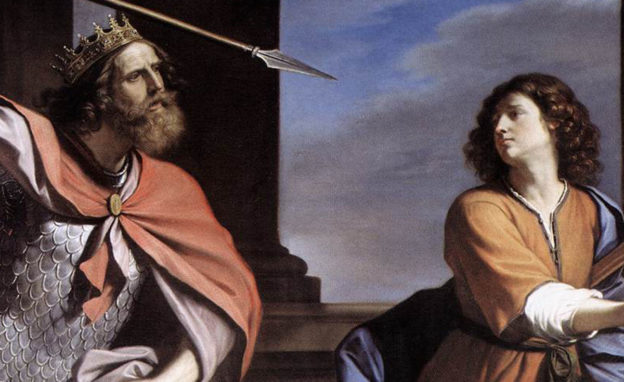Life offers up difficult situations where we are unsure of what to do. We may struggle with questions of relationships, jobs, where to live, and wonder how to glorify God. When these situations arise, as believers one of our natural inclinations is to seek God’s guidance in what to do. But where do we go to seek God’s guidance? And does God offer guidance?
The answer is yes! God does offer guidance in how to live. We see this demonstrated in God’s guidance to David in 1 Samuel 23. David, faced with his own questions about what to do, sought God’s guidance. God provided that guidance to David through his priest. God provides that guidance to us through our Great High Priest, Jesus, and the Scriptures which both point us to him and come from him.
Chapter 23 begins by again highlighting the dramatic difference between Saul and David. Saul had destroyed an Israelite town and killed all (but one) of the Levitical priests as revenge for helping David.
David, on the other hand, heard that the Philistines were attacking another Israelite town, Keilah, and stealing their food (v.1). Instead of leaving them to their fate given his own situation, David was moved to help God’s People. He inquired whether he should attack the Philistines and God told him “Go and attack the Philistines and save Keilah” (v.2).
While David trusted God, his followers were less sure in the circumstances (v.3). So David asked for direction from God, and God confirmed his leading to David: “Arise, go down to Keilah, for I will give the Philistines into your hand” (v.4).
David and his men went down to Keilah, and just as God said would happen, they defeated the Philistines and took away their cattle (v.5). “So David saved the inhabitants of Keilah” (v.5) while Saul destroys townships.
Abiathar, the remaining priest, was with David at Keilah, along with the Levitical ephod that symbolised priestly office (v.6). Saul meanwhile had heard David was there, conveniently locked up behind walls! (v.7). So Saul raised the army to attack Keilah, and rid himself of David (v.8).
When David heard that Saul knew he was in Keilah, he went to Abiathar, and had him bring the ephod which held the Urim and Thummim (v.9, the Urim and Thummim were some sort of object provided to discern God’s Will).
David knelt down before God and prayed, seeking God’s guidance. David wanted to know if Saul would come down to kill him and if the inhabitants of Keilah would hand him over (vv.10-11).
Through the Urim and Thummim, God gave two answers. Firstly, yes, Saul would come down against David at Keilah (v.11). Secondly, yes, Keilah would hand him over to save their skin (v.12).
David knew what to do from there. David and his 600 men left Keilah, and scattered (v.13). Saul gave up his expedition (v.13). David and company returned to their stronghold base, and evaded Saul’s soldiers in the wilderness (v.14).
David was particularly privileged. He asked direct questions of God, and received answers through the Urim and Thummim. We do not have the same objects today. We do not have the same direct privilege; we are not David. But we do have something David looked forward to. We have something better.
David relied on a sinful priest and physical objects as the mediator between him and God. We have the Great High Priest, Jesus, to mediate on our behalf. And we have God’s Word, which reveals Jesus to us but also reveals God’s Will through the words on the pages, rather than a physical object.
Since we have Jesus to forever mediate and intercede for us, we can come boldly to the throne of grace and seek God’s ear, and seek God’s leading (Heb 4:14-16). Jesus will provide us with the help we require in time of need.
He has done that through his Word, which reveals to us how to act when we face difficult decisions. It reminds us, firstly, to act in a way which is obedient to God’s Will, as David did when he sought God’s guidance on where to go and what to do. He heard God’s Word, and obeyed it. Not what God forbade, but what God approved.
Secondly, it reminds us that the decisions we make should glorify God, rather than ourselves. David led his men to save Keilah because it brought glory to God, not to himself.
Thirdly, he acted in a way which was wise and godly. He could have remained where he was, but acted in a way which benefited God’s People and his own company, demonstrating God’s goodness and provision to both.
David glorified God because he trusted in God’s leading. He trusted in God to save. That same God has saved us through Jesus, our Great High Priest, who intercedes and mediates for us. By seeking God’s guidance through God’s Word, we too can glorify God and submit to his will in thankful obedience.


